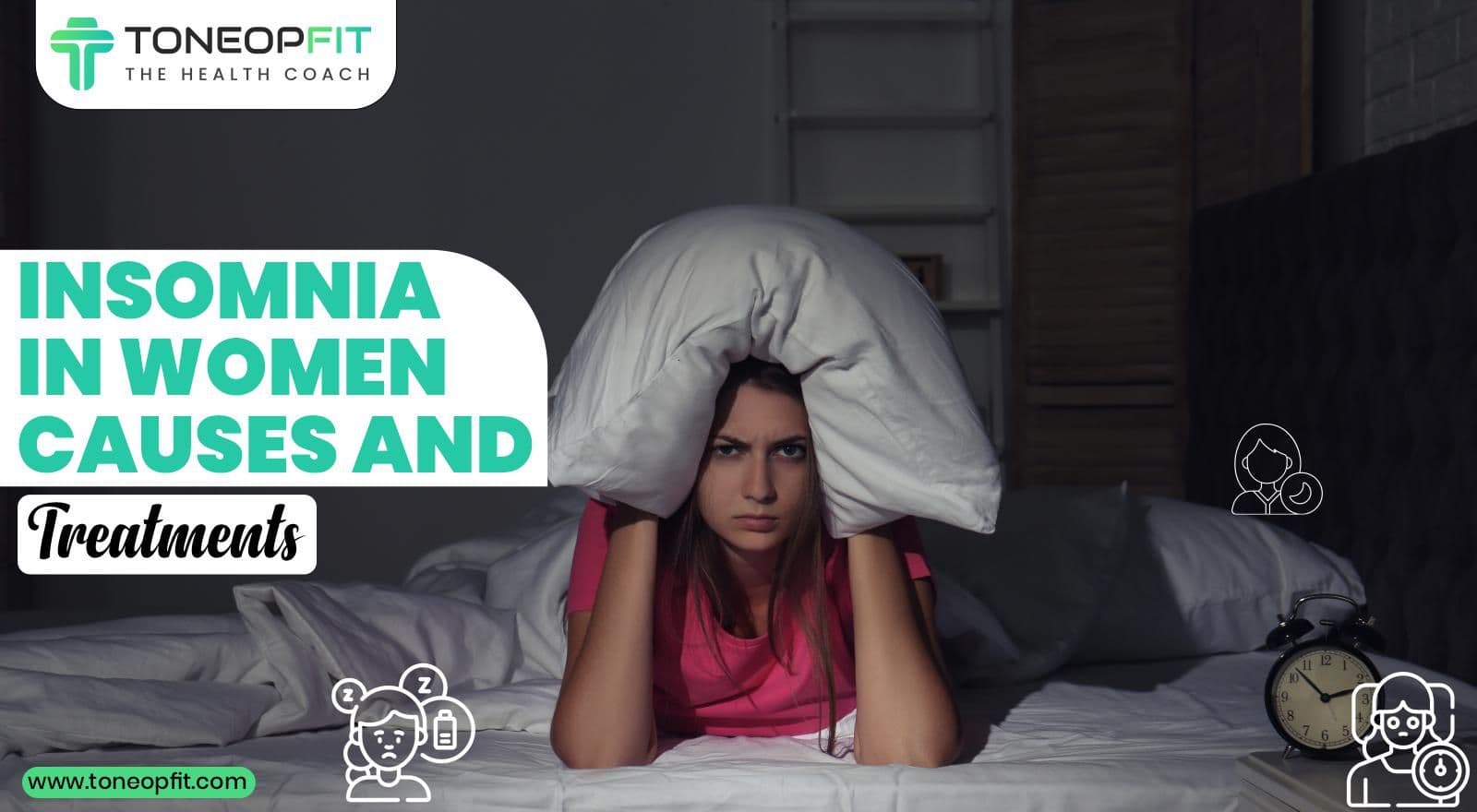Women often face sleepless nights or insomnia at different times in their lives, thanks to hormonal shifts. Changes during the menstrual cycle, pregnancy, and menopause can make it tough to fall asleep or stay asleep. In fact, globally, about one in four women struggle with insomnia symptoms.
Furthermore, women are more likely to experience psychological issues, including anxiety, depression, and restless leg syndrome, which can make insomnia symptoms worse. Lifestyle decisions like excessive caffeine consumption and erratic sleep patterns can also cause sleep problems.
To properly treat insomnia and enhance women's sleep quality, it is imperative to comprehend these complex factors. Let us dive into this blog to learn about insomnia in detail, the causes of insomnia in women, treatment options and medications to treat it.
Table Of contents
1. What Is Insomnia?
2. What Are The Causes Of Insomnia In Females? 10 Reasons For Insomnia In Women
3. Does Menopause Cause Trouble Sleeping?
4. Treatment Of Insomnia In Women
5. Medicines For Insomnia
6. Expert’s Advice
7. The Final Say
8. FAQs
9. References
What Is Insomnia?
It could be as scary as that Christopher Nolan movie.
A common sleep issue called insomnia makes it difficult to fall asleep or stay asleep for extended periods of time. Difficulty falling back to sleep or waking up early in the morning is a big part of this sleep disorder. It can be an acute, short-term or long-term problem that comes and goes or can last for months or longer. The most common causes of this condition are family pressure, traumatic events or occupational stress.
Women are much more likely to suffer from this sleep disorder than men. About 1 in 4 women can develop this condition at some time in their lives. Studies show that women generally take longer to fall asleep, sleep less, and feel more tired after waking up than men. Usually, they have multiple symptoms of insomnia, including trouble falling asleep, trouble remaining asleep, and waking up too early. Experts say this is a combination of hormonal differences and health issues that are more common in women.
A study found that about 93 per cent of Indians do not get enough sleep due to the intrusion of modern devices and lifestyle changes. Most cases of chronic insomnia are secondary, meaning that they are a side effect or symptom of another problem, such as a specific medical condition, another sleep disorder, or certain medications. Substances such as alcohol, tobacco, and caffeine can also cause this condition. Sometimes, chronic insomnia is primary, meaning that another medical condition does not cause it.
What Are The Causes Of Insomnia In Females? 10 Reasons For Insomnia In Women

Many issues can cause insomnia and prevent you from getting a good night’s sleep. Here are ten prominent causes of insomnia in women:
1. Mental Health Issues
Sleep disturbances and interference can be caused by mental health conditions such as anxiety, sadness, and post-traumatic stress disorder.
- Anxiety: Anxiety was 9.8 times more common in those with insomnia than in those without. Researchers believe this is because anxiety and insomnia imply hyperarousal. The neurotransmitters in your brain that aid in sleep regulation may not be functioning correctly if you have any of these diseases.
- Depression: Participants with sleeplessness had a 19.7-fold higher risk of developing depression than those without. It is crucial to remember that sleeplessness and sadness are related to a vicious cycle where one makes the other worse.
You can try mental health exercises to improve your psychological health, cope with stress and anxiety, and also develop resilience.
2. Medical Condition And Medications
Common medical conditions associated with insomnia include cancer, chronic pain, heart disease, diabetes, asthma, an overactive thyroid, Alzheimer's disease, GERD or gastroesophageal reflux disease, and Parkinson's disease.
A variety of prescription medications can also disrupt your natural sleep cycle. These include blood pressure medications, asthma medications, and antidepressants. Some medications, such as pseudoephedrine, can make it harder to fall asleep. Many over-the-counter pain, allergy, colds, and weight-loss medications can also cause insomnia because of their caffeine content.
3. Sleep-Related Disorders
Restless leg syndrome, which can produce discomfort in the legs and a need to move them, may hamper your ability to get a good night's sleep. This can manifest as calf muscle pain or leg cramps at night.
Some people describe restless leg syndrome as a crawling sensation and a desire to move their legs. It is usually worse at night and can make it difficult to sleep.
Low iron levels, diabetes, drugs, pregnancy, and renal failure are among the causes. Sleep apnea is another disorder that disrupts sleep by periodically stopping breathing throughout the night.
4. Stress
Stress activates fight-or-flight mode by causing hormones like cortisol to flow through your body. These hormones increase your blood pressure and heart rate. You may be able to fall asleep during stressful situations, but the quality of your sleep may deteriorate.
ToneOp Fits Live Yoga Session can help relieve stress, aid sleep, and help manage lifestyle disorders.
Also Read: 5 Stress Relief Workouts And 7 Ways To Unwind For A Balanced Life
5. Premenstrual Syndrome (PMS)
Hormonal changes during the menstrual cycle might cause premenstrual syndrome (PMS). PMS can impact your body's reaction to the hormone melatonin, which encourages sleep. PMS can cause insomnia primarily due to hormonal fluctuations, especially the drop in progesterone just before menstruation.
This hormonal shift can disrupt sleep patterns, leading to difficulties falling and staying asleep, as well as increased anxiety and discomfort from other PMS symptoms.
6. Menopause
You may start to have hot flashes and night sweats as your body transitions into menopause, which can disrupt your sleep. About 40 to 60 per cent of people experience insomnia during menopause or postmenopause. You may wake up earlier than usual and feel less rested. This condition can occur with depression or anxiety, making it even harder to fall asleep.
7. Alcohol, Nicotine, And Caffeine
Alcohol or certain medications can also make it harder to fall asleep or reduce the quality of your sleep. Drinking caffeine or using other stimulants right before bed can also interfere with falling asleep or staying asleep.
Cola, tea, coffee, and other caffeinated beverages are stimulants that can disrupt sleep if consumed late in the evening or during the day. Cigarettes contain nicotine, a stimulant that disrupts sleep. Alcohol induces sleep, but it blocks deep sleep stages and causes you to wake up at midnight.
8. Work Or Travel Schedule
The circadian rhythm is an internal clock determining your metabolism, body temperature, and sleep-wake cycle. If your body’s circadian rhythm is disrupted, insomnia can occur. Some common causes of circadian rhythm disruption include working early or late shifts, frequent shift changes, and travelling to different time zones.
9. Overeating Late At Night
Having a snack before bed is okay, but overeating in the evening can cause physical discomfort when you lie down. You may also experience heartburn and stomach acid reflux after eating, which can keep you from sleeping.
10. Bad Sleep Habits
Stimulating activities before bedtime, such as irregular bedtimes, uncomfortable sleeping conditions, eating, watching TV, working, and napping in bed during the day, are bad sleep habits that can cause insomnia over time. Playing video games or using the TV, computer, or smartphone before bed can disrupt your sleep cycle.
Also Read: Struggling With Sleepless Nights? Try These 7 Best Yoga for Better Sleep
Does Menopause Cause Trouble Sleeping?
Menopause is often when other changes occur in a woman's life. You may be caring for ageing parents, supporting children in the transition to adulthood, taking on more responsibilities at work, and thinking about your life path. When you combine all of these menopausal symptoms, you could experience difficulty falling asleep at night.
Hot flashes, especially night sweats, and mood swings – especially depression – can contribute to poor sleep. Managing these problems can also help manage sleep symptoms.
Treatment Of Insomnia In Women
Many people can achieve good sleep by changing their bedtime habits and eliminating worries that cause insomnia. If these methods don't work, your doctor may suggest cognitive behavioural therapy, sleep medications, or a combination.
1. Cognitive Behavioral Therapy
Cognitive behavioural therapy is often recommended as a first line of treatment to help manage stress and overcome unpleasant thoughts. It is more effective than drugs. Cognitive behavioural therapy may include:
2. Stimulus Control Therapy
This plan helps you eliminate the things that keep you from sleeping. For example, she suggests going to bed and getting up at the same time every day, skipping naps, and leaving the bedroom until you feel drowsy again if you can't fall asleep within 20 minutes.
3. Relaxation Techniques
Breathing techniques, biofeedback, meditation, and progressive muscle relaxation can all help lower anxiety before bed. These techniques aid in relaxation by giving you control over your breathing, heart rate, tense muscles, and mood.
4. Sleep Restriction
This therapy reduces the time spent in bed and discourages daytime sleep, resulting in partial sleep deprivation and increased fatigue the next night. Your time in bed gradually increases as your sleep improves.
5. Passively Wake Up
This method uses a sunrise alarm clock that mimics natural light, adding calming noises or soft vibrations and sticking to a regular sleep pattern are some strategies. Women can improve their sleep quality and wake up feeling more rested by reducing sudden awakenings and establishing a relaxing morning routine, which will ultimately lead to improved sleep habits.
6. Light Therapy
Women with insomnia may find light therapy to be a successful treatment, especially if their sleep issues are related to changes in their circadian cycle. This treatment entails spending a certain amount of time every day—usually in the morning—exposed to strong, artificial light. By indicating when to be awake and when to go to sleep, the light aids in controlling the body's internal clock. It makes it a good choice for women who are having trouble sleeping, particularly during seasonal or hormonal fluctuations.
ToneOp Fit’s Home Workout Sessions are a great way to unwind, destress and battle insomnia in women.
Medicines For Insomnia
Medications such as benzodiazepines and zopiclone are sometimes used to treat insomnia. However, it is essential to talk to your doctor before taking any medication for insomnia. They can help you determine which one might work best for you and what potential side effects to watch out for.
There are many over-the-counter sleep aids on the market these days, like:
1. Antihistamines
These medications treat allergic reactions and are included in over-the-counter cold and flu medications. The smart thing about antihistamines is that they make you very sleepy. However, they are not intended for general use. Side effects may include dry mouth, constipation, daytime sleepiness, and difficulty urinating.
2. Melatonin
A naturally occurring hormone called melatonin regulates our circadian rhythm. Studies have shown it to be an effective sleep aid for individuals with jet lag or trouble falling asleep. However, melatonin can have mild side effects, such as daytime sleepiness or headache.
3. Valerian Root
Valerian is one of the many herbal remedies available to the general public. Since ancient Greece and Rome, it has been used to alleviate insomnia. It is derived from the root of the Valeriana officinalis plant. This dietary supplement is marketed as a sleep aid because it has a mild sedative effect.
Also Read: Feeling Extra Sleepy Lately? Here Are 6 Causes of Excessive Sleep And Symptoms Of Hypersomnia!
Expert’s Advice
If you’re struggling to sleep, I recommend keeping a sleep diary to track your patterns and symptoms, especially around your menstrual cycle. This can help you identify triggers and discuss them with your healthcare provider for tailored advice.
Additionally, try incorporating relaxation techniques like yoga or meditation into your routine; they can significantly reduce stress and improve sleep quality.
Also, consider adjusting your diet by reducing caffeine and sugar intake while increasing calcium-rich foods to support better sleep.
Health Expert
Lavina Chauhan
The Final Say
Insomnia is common in women and can be chronic or come and go. Pregnancy, menstruation, hormonal fluctuations, stress and discomfort and menopause are a few causes of insomnia in women. Sometimes, chronic insomnia increases the risk of mental disorders.
Good sleep hygiene creates the right atmosphere for sleep and can help you relax before bed and sleep better throughout the night. Remember, you’re not alone in this journey—many women experience similar challenges, and finding the right strategies can make a world of difference!
FAQs
1. Why do women suffer from insomnia?
A few reasons why women suffer from insomnia are:
- Hormonal changes
- Mood disorder
- Stress, anxiety and depression
- PMS
- Menopause
2. What is the most common cause of insomnia?
The most common causes of insomnia are stress, anxiety and sleep disorders.
3. What female hormones cause insomnia?
Numerous systems that control sleep are influenced by the female sex hormones progesterone and estrogen. Insomnia may result from fluctuating levels during menstruation, pregnancy, and perimenopause.
4. What are the sleeping problems in women?
Women experience many sleeping problems like:
- Insomnia
- Sleep apnea
- Sleep disorder
- Excessive daytime sleepiness
- Parasomnia
References
- https://flo.health/menstrual-cycle/lifestyle/sleep/insomnia-in-women
- https://www.medicoverhospitals.in/hi/diseases/insomnia/
- https://www.nia.nih.gov/health/menopause/sleep-problems-and-menopause-what-can-i-do#:~:text=Hot%20flashes%2C%20especially%20night%20sweats,sleep%20aids%20such%20as%20melatonin.
- https://www.healthline.com/health/insomnia/causes-of-insomnia-in-females#takeaway
- https://www.medicalnewstoday.com/articles/women-hormones-and-insomnia#takeaway
- https://www.metropolisindia.com/blog/hindi/insomnia-in-hindi
About ToneOp Fit
ToneOp Fit is a platform dedicated to improving and maintaining good health through a comprehensive range of goal-oriented health plans with up to 3 Coach support. The app offers Weight Management, Medical Condition, Detox, and Face Yoga Plans and also provides premium health trackers, recipes, and health content. Get customised diet, fitness, naturopathy, and yoga plans and transform yourself with ToneOp.











































